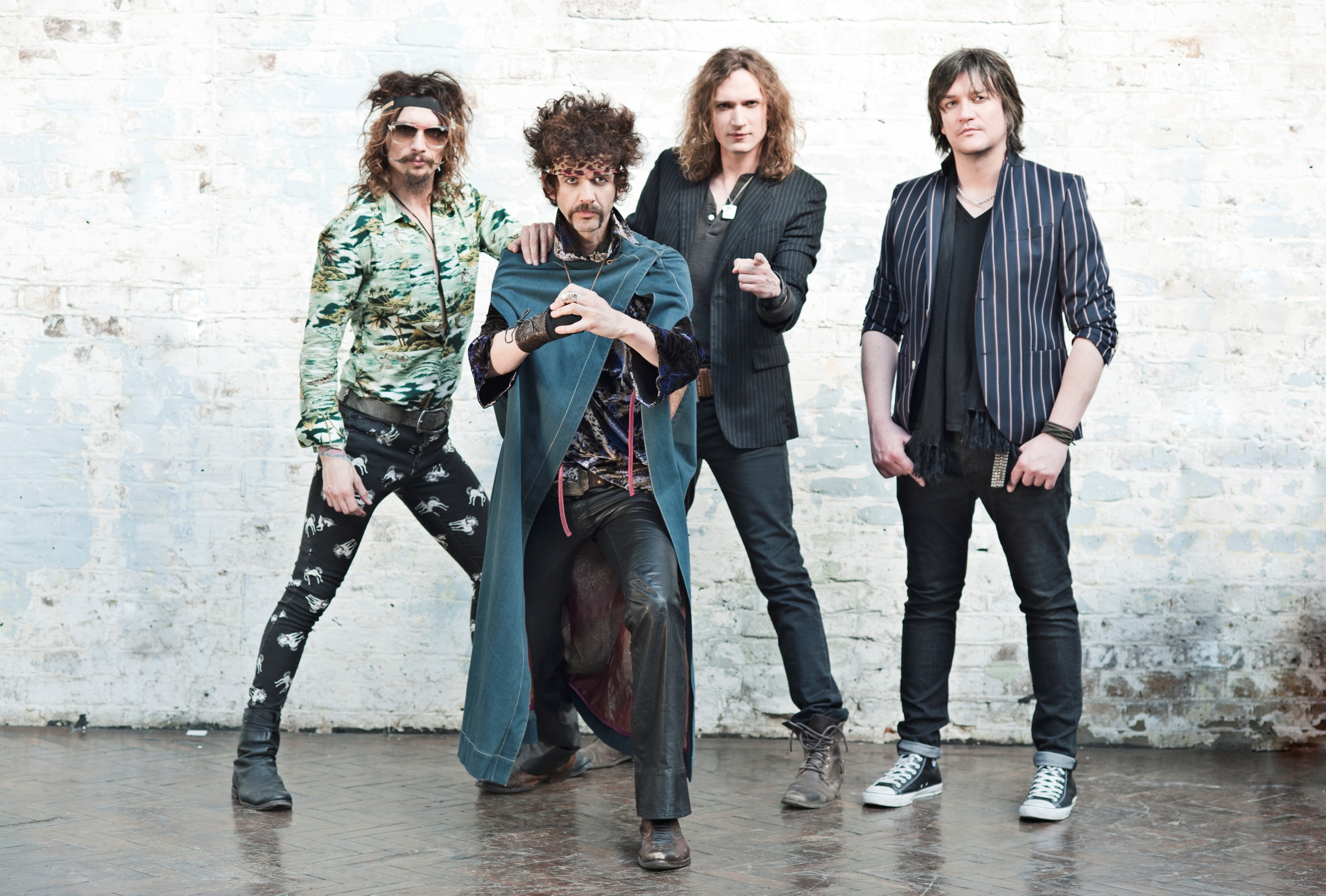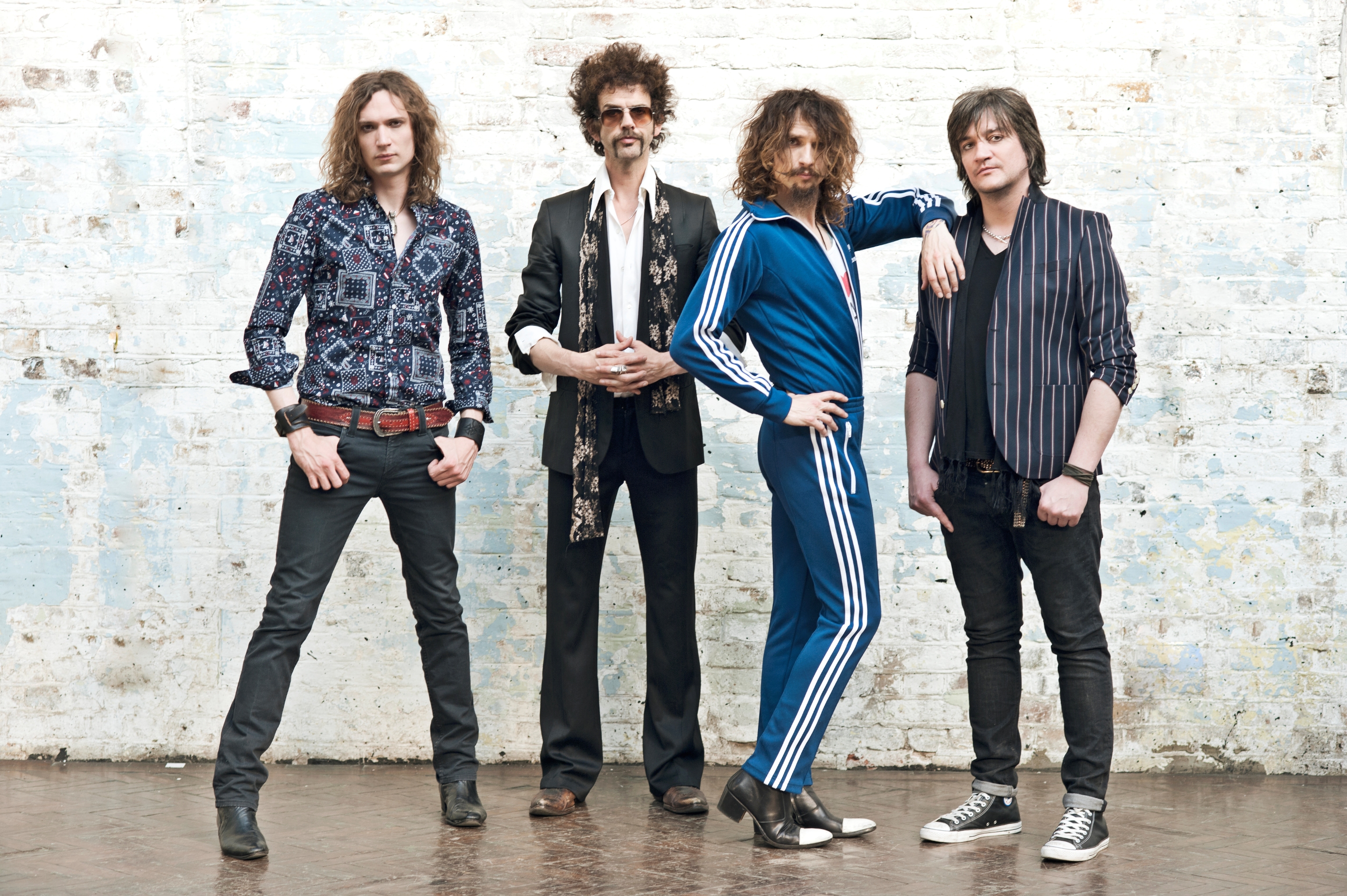Frankie Poullain on bass, The Darkness and showmanship
The rocker talks life lesssons, Abba, and Growing On Me

The Darkness

The Darkness
BASS EXPO 2014: If ever a modern day rock act could be credited with embodying the flamboyance, explosive energy, and general pomp of stadium beaters like Led Zeppelin, Queen, and The Who, The Darkness are it.
When bassist Frankie Poullain left the Suffolk four-piece in 2005, many fans felt as though the heart had gone from this playful yet seriously talented band. Before reuniting with The Darkness in 2011, the once Venezuelan mountains guide, Poullain, put pen to paper for a "self help" book called Dancing In The Darkness.
We speak to him now about his childhood musical loves, why he prefers Gibson basses over Fenders, and how the key to confidence on camera is imagining you're in bed with a beautiful woman.
What were your musical interests as a child? Did you grow up in a musical home, or did you find it on your own?
"I was lucky, there was some great mainstream pop music around during my formative years, before I became self conscious, pissed off and politicised: Abba, Jackson 5, The Carpenters, and Queen, of course. Then, with the advent of video, the two [songs] that stuck in my head were Adam Ant's Prince Charming, and David Bowie's Ashes to Ashes - they had a real magic about them, for a teenager especially.
"My father was a classical violinist, one of the founder members of the Edinburgh Quartet. He came from a working class family in Hartlepool and won a scholarship to the Guildhall of Music. He left us when I was seven, which was just as well really as he's a sadistic tyrant who would have made my life unbearable.
"I started enjoying and appreciating the sound of the bass guitar when I entered the second stage of my musical development: the 'alternative' or indie scene of the 80s. It was an ugly time in many ways and the melancholic escapism and musical adventure of New Order, The Smiths, Echo and The Bunnymen, Cocteau Twins, and eventually My Bloody Valentine appealed to me greatly."
How did you get into playing bass, and were you self taught or did you take lessons?
"I dropped out of University in Bath and formed a band with my Welsh pal Neil Ovey. We drank constantly, read Charles Bukowski, and did a lot of drugs together. The music got darker and eventually quite confrontational - 'art terrorism' I remember it was referred to in a local review. My bass guitar (which I couldn't play, and still can't really) was a weapon, tuned down to C sharp and distorted. I was blown away by a band I chanced upon in a Bristol discotheque. [They were called] World Domination Enterprises. They were raw and dissonant, and the guitar sound was unbelievable, like a thousand cats being skinned alive."
Get the MusicRadar Newsletter
Want all the hottest music and gear news, reviews, deals, features and more, direct to your inbox? Sign up here.
What are your favourite bass lines to play in The Darkness and why?
"She's Just A Girl, Eddie, and Concrete from the new album [Hot Cakes] are quite dramatic as songs and challenging to play. I enjoy playing them live."
"If you want to make great music, you must fight to make sure your vision is realised and not watered down"
You've been known to play a Gibson Thunderbird IV, as well as a Fender Precision Bass. What do you look for when choosing a bass guitar - what's the criteria?
"I'm drawn to something you really have to grapple with. I like the struggle of the T bird, the way it doesn't balance properly and the sound of it which is unapologetic and full of character. It doesn't try to fit in. I like a Rickenbacker for the same reasons but they don't sound right with The Darkness sound. There's just something 'sensible' about Fenders which I find offensive."
What styles are you most comfortable with on bass guitar? Similarly, what do you wish you were better at?
"Riffing is nice and Dan [Hawkins, guitar] comes up with so many great big sounding riffs. Pedaling - doing it well - is hard. I find that very tough. Ed [Graham, drums] really holds things down and keeps the tempo back which is important. I used to be more excitable and play ahead of him, but now I'm older I think I synch in with Ed better."
We're still crazy about your debut album. So, would you please give us some tips on how to play the bass line from Growing On Me?
"You need to be more aggressive than you think for this one even though it sounds 'songy' and melodic. The magic of the song lies in the chunky energy and exuberance of the backing track set against the super melodic vocal and lead guitar of Jus[tin Hawkins, guitar and lead vocals]. Not to mention the wit of the lyrics. On Permission To Land, we were really going for it on every song bar Holding My Own, which is better as a live song now as we never had the chops or confidence to pull it off on the album."
The lessons learned
In a recent newspaper interview, you said the music industry can be "a zapping experience". What advice can you give to new bands to avoid being 'zapped'?
"I guess when you're doing well you don't mind being 'zapped'. I mean, I'm sure Coldplay are being 'zapped' and don't mind. It just means that their music is lifeless and utterly pointless, a bit like our second album! If you want to make great music, you must fight to make sure your vision is realised and not watered down. Never try to fit in."
Was writing Dancing In The Darkness a cathartic experience?
"No, not really. I just tried to make it silly and not be self indulgent. It's a bit soul destroying writing about yourself because one is constantly struggling with the ego thing and questioning how delusional one is. That's why I tried to make it into a self help book that celebrates making mistakes. A celebration of contradictions. It's obviously a pain in the arse for people who are mentioned in the book because they want their say too, quite rightly."
What's the biggest life lesson you have learned so far from being in The Darkness?
"Always look a gift horse in the mouth."
The art of showmanship
As a band, you always look phenomenal when playing live. How much effort do you put into your performances?
"We sometimes look great but just as often look ridiculous or plain outright bad. The point is we try stuff out and have a laugh. We aren't afraid to make dicks of ourselves. Personally speaking, I like to confuse people."
You have crazy amounts of energy, too. How do you keep that up during longer sets? Do you maintain fitness through sports, or is there something more primal feeding you live - like the energy from your fans?
"The music is built to expend energy to - it's all in the construction. Justin works out a lot and has always had explosive energy and an uncanny knack for tuning into an audience. What's going on is primitive but not just on a physical level. There's also something psychic going on, but then again that shouldn't be a contradiction because [in] becoming less primitive or more civilised, if you like, humans do lose a lot of our intuitive qualities. The instincts that animals have. And rock 'n' rollers, too... Hence the rock 'n' roll animal, as opposed to the indie sheep."
Finally, what are your top tips for building confidence on camera and onstage?
"Think of something that makes you angry or with a point to prove. Don't be soppy. Imagine you're going into battle, or about to make love to a beautiful woman."
“I really thought I was going to die... and it absolutely was so freeing”: Blink 182’s Mark Hoppus talks surviving cancer and his band’s resurrection
"I remember showing up at 10 or 11 in the morning and working on solos and that leading to two or three o’clock in the morning the next day”: How Metallica beat the clock and battled fatigue to create a poignant and pulverising anti-war epic









